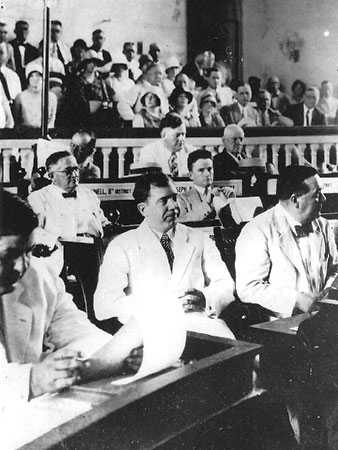Huey Long, Jr. nicknamed The Kingfish, was the 40th Governor of Louisiana from 1928 to 1932 and served in the U.S. Senate from 1932 until his assassination on September 8, 1935.

Louisiana Governor Huey Long
Long was a vehement populist who denounced the rich and banks and instituted a campaign in 1934 called “Share Our Wealth,” which had the motto “Every Man a King.” His program called for measures to redistribute wealth by means of a net asset tax on corporations and wealthy individuals. He also advocated federal spending on public works, schools and colleges, and old age pensions.
Even while governor of Louisiana, Long oversaw massively increased expenditures for public education and increased appropriations to the state university. A medical school was established and prisons were reformed and improved. A highway-building program added 2,500 miles of paved roads, 1,308 miles of asphalt roads, and 9,000 miles of gravel roads. Major bridges were built across the Mississippi and other large Louisiana rivers. Free textbooks, charity hospitals, old-age pensions, free night schools for adults, sales taxes and higher gasoline, corporate, franchise, and severance taxes were approved by the legislature.

Huey Long’s family on the road for his U.S. Senate campaign.
In order to finance his building and social programs, Long asked the legislature to enact a 5 cent-per-barrel tax on the production of refined oil. This was anathema to Standard Oil. In 1929, Standard Oil’s legislative allies led an unsuccessful attempt to remove Huey Long from the governorship on a variety of charges, ranging from serious to comical. He was impeached in the State House but avoided conviction in the State Senate.

Huey Long at the impeachment proceedings.
After this, Long at first felt despair, but it turned to anger, and he began to employ ruthless tactics to ensure loyalty and deal with his enemies. He told one biographer: “I used to try to get things done by saying ‘please’,” said Long. “Now… I dynamite ’em out of my path.”
Long ran for the U.S. Senate in 1930, defeating his opponent in a landslide; his term began in March, 1931. Long, who originally was a supporter of Franklin D. Roosevelt, became a vigorous opponent of the New Deal, going so far as to actively oppose New Deal candidates for public office. In turn, Roosevelt supporters worked against Long candidates in Louisiana. IRS investigations were launched in an attempt to undermine and discredit Long and his partisans. Nevertheless, Long explored a candidacy for 1936 presidential election.

Huey Long
His career came to an end just before his 42nd birthday when he was shot and killed by Dr. Carl A. Weiss, Jr., in the Louisiana state capitol at Baton Rouge. (Weiss was the son-in-law of a political opponent of Long’s.) His last words were, “God, don’t let me die. I have so much to do.” He would have been gratified to know that his political influence extended for many decades as state politics became divided between “Long” and “Anti-Long” factions. His brother, Earl K. Long served as lieutenant governor, 1939-1940, and as governor, 1948-1952, 1956-1960. His son, Russell B. Long served as U. S. senator for nearly forty years.
His reputation has not survived intact, however. The very popular and influential book and movie “All the Kings Men” portrayed Long as a cynical and manipulative populist who embraced corruption and intimidation to consolidate his power. (All the King’s Men by Robert Penn Warren received the 1947 Pulitzer Prize and was chosen as one of Time Magazine’s 100 best novels since 1923.) Warren himself said in the introduction to the 1953 publication of the book that regarding the equation of his protagonist, Willie Stark, with the late [US] Senator Huey P. Long, that was unfortunate and “innocent boneheadedness or gospel-bit hysteria.” (He also acknowledged that, nevertheless, it was just this assumption that evoked so much interest in the book.)

Broderick Crawford stars in director Robet Rossen’s Oscar-winning 1949 drama ‘All the King’s Men,’ based on the Robet Penn Warren novel of the same name, which was allegedly inspired by the career of former Louisiana Gov. Huey P. Long.
Long deserves to be remembered for his actual words and deeds. In Long’s most famous speech, a radio address delivered on Feb 23, 1934, he asked:
How may of you remember the first thing that the Declaration of Independence said? It said, ‘We hold these truths to be self-evident, that there are certain inalienable rights of the people, and among them are life, liberty, and the pursuit of happiness’; and it said, further, ‘We hold the view that all men are created equal.’
Now, what did they mean by that? Did they mean, my friends, to say that all men were created equal and that that meant that any one man was born to inherit $10,000,000,000 and that another child was to be born to inherit nothing?
Did that mean, my friends, that someone would come into this world without having had an opportunity, of course, to have hit one lick of work, should be born with more than it and all of its children and children’s children could ever dispose of, but that another one would have to be born into a life of starvation?
That was not the meaning of the Declaration of Independence when it said that all men are created equal or ‘That we hold that all men are created equal.’”

Huey Long addressing the nation on CBS radio. Long was the first politician to use national radio addresses to champion his causes to an estimated 25 million listeners.
You can read his entire speech here. You can also learn much more about Long, his life and his legacy, here.




Leave a comment